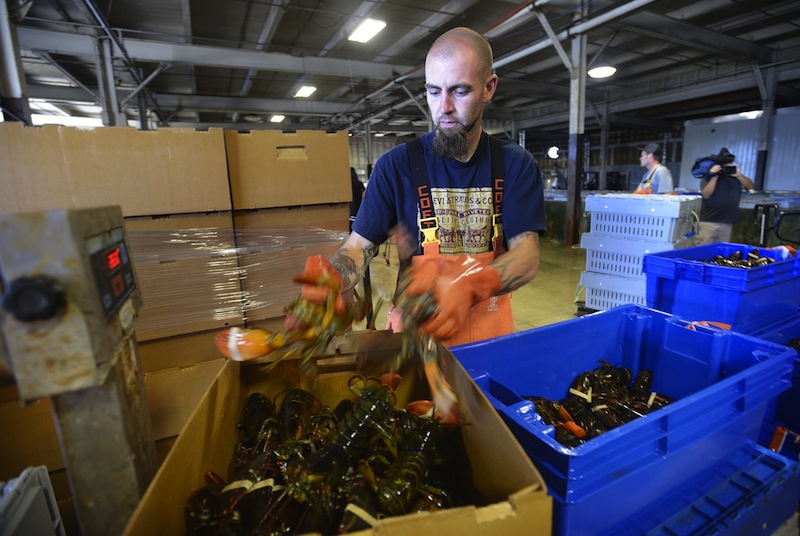Maine lobstermen had a terrific year in 2012, hauling a record 123 million pounds of the crustaceans from state waters, a whopping 18 percent increase from the year before.
But Maine lobstermen also had a terrible year in 2012, netting just $331 million for that catch, a decrease of $3.7 million from 2011.
“It’s unbelievable,” said David Cousens, a member of the Maine Lobstermen’s Association. “The resource is in great shape, but the economics of the industry are in horrible shape.”
The preliminary report on the 2012 season from the Maine Department of Marine Resources comes as state officials are holding meetings with lobstermen this month to discuss what to do about the sharp increase in supply — the catch is up nearly 30 percent since 2010 and 75 percent since 2005 — and falling prices.
For the 70 million pounds of lobster caught in 2005, Maine lobstermen made $320 million, almost as much as they did last year with a dramatically larger catch.
The market went out of balance sharply this year, with an unprecedented glut of soft-shell lobsters that started showing up in traps in May, a good two months ahead of schedule. And then they just kept coming all through the summer, driving down the price paid to lobstermen to as low as $2 a pound.
The problem with soft-shell lobsters is that they are the bottom of the barrel as far as quality and price. They can’t survive shipping, even to markets as close as New York, so they either need to be sold locally or sent to Canada, where processors pay low prices, as a market of last resort.
At one point this summer, Canadian lobstermen shut down several processing plants with protests, complaining that the American lobsters were flooding their market and driving prices down just as they were about to head back out on the water during their government-regulated fishing seasons.
Cousens said Maine lobstermen may need to start following the lead of their northern colleagues and limit fishing during July and August, the prime months for soft-shells.
“We need to stop catching the lobsters when they’re not worth anything and you can’t do anything with them,” he said. “It needs to happen and it needs to happen soon.”
Cousens said Maine lobstermen would be better off harvesting more in the spring and fall, when the shells are hard, the lobsters can be shipped farther to domestic and overseas markets and prices would be higher. He said voluntary steps aren’t likely to work, so the state may need to step in to establish fishing seasons, something that has long been resisted by most of the state’s 4,345 active lobster fishermen.
But Cousens said there are inequities within the lobstering industry that will make finding a solution difficult.
He said lobstermen Down East are catching 70 percent of the lobster hauled in the state and are making up for low prices with high volume.
Meanwhile, for lobstermen in midcoast and southern Maine, “it’s another world,” he said, with the catch failing to make up for the low prices. “Those people are struggling.”
Any attempt to find a solution will also be complicated by an industry that is resistant to change, said Bob Baines, a member of the Lobster Advisory Council.
“Our industry is changing and the people involved in it need to pay attention and we need to change with the times,” Baines said. “We have a robust fishery and our margin of profitability has gotten less and less, so something’s wrong.”
Baines declined to endorse or reject Cousens’ suggestion that lobstering seasons be regulated, but said he hopes lobstermen are open to suggestions that arise in the Marine Resources department meetings.
“We need to look at everything,” he said.
Peter McAleney, who owns New Meadows Lobster and is a major wholesaler, said he’s hoping a return to normal weather will help right the ship and that a cold winter, at least thus far, might restore the industry’s normal rhythms.
“For years, the water temperatures dictated how the seasons happen,” he said, but a warm 2011-2012 winter threw that pattern out of whack and led lobsters to shed their shells earlier.
“We weren’t ready for it,” McAleney said, so the supply of lobsters backed up and prices plummeted in an effort to unload the catch.
He said prices are still relatively low at about $5 a pound, but it’s a slow time for both lobstermen and consumers.
McAleney warned that if order is restored to the market in terms of supply, customers may balk after enjoying record low prices in 2012.
“The problem now is that the consumer expects a cheap lobster,” he said.
Staff Writer Edward D. Murphy can be contacted at 791-6465 or at:
emurphy@pressherald.com
Send questions/comments to the editors.




Success. Please wait for the page to reload. If the page does not reload within 5 seconds, please refresh the page.
Enter your email and password to access comments.
Hi, to comment on stories you must . This profile is in addition to your subscription and website login.
Already have a commenting profile? .
Invalid username/password.
Please check your email to confirm and complete your registration.
Only subscribers are eligible to post comments. Please subscribe or login first for digital access. Here’s why.
Use the form below to reset your password. When you've submitted your account email, we will send an email with a reset code.